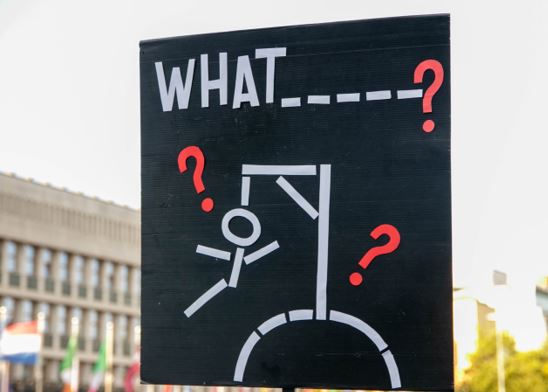At Monday’s gathering of some of the journalists of the national media outlet, Radio-Television Slovenia (RTV), in front of the National Assembly of the Republic of Slovenia, we saw, among other things, a banner that indirectly called for the hanging of the Director-General of RTV, Andrej Grah Whatmough. In its response to this, the Association of Journalists and Publicists emphasised that it strongly condemns the death threats against the Director-General of RTV Slovenia.
“The journalists of RTV Slovenia have the right to express their disagreement with the management of RTV Slovenia, but banners calling for violence and murder do not belong to such rallies,” the Association of Journalists and Publicists pointed out, adding that they expect the police and the prosecution to take action against those responsible, and they also expect that the RTV Slovenia journalists will distance themselves from such actions.
The Association still believes that the RTV Slovenia strike is, first and foremost, politically motivated, with its primary purpose to serve the new government of Robert Golob, so it could prematurely change the management team of RTV Slovenia and replace it with people that are more to its liking and also more loyal to it. “The management team of RTV Slovenia has both the legal and the legitimate right to make certain changes at RTV Slovenia, which we in the Association of Journalists and Publicists have also pointed out in recent years as urgently needed,” they added in their response.
The fight for higher wages is of secondary importance
This is undoubtedly a case of a unique strike in the history of European public service broadcasters, as the fight for higher wages is actually of secondary importance to the RTV employees. Namely, their main demands are a change in the editorial policy and the demand for staff changes, which is by no means within the competence of the journalists employed there. They have apparently forgotten that the public service broadcaster RTV Slovenia has precise rules on how the content of the programme is determined.
In a press release from a few days ago, the Director-General of RTV explained that the management had addressed most of the strike demands, meaning that it was willing to hire new journalists for the news programme and even set up an expert commission to investigate the alleged interference in journalistic autonomy. And at Wednesday’s session of the Committee on Culture, the RTV Director-General also revealed that the strike demands of the journalists are actually more about the well-paid journalists wanting to replace him, the President of the Programme Council, and the editor-in-chief of the news programme on TV Slovenia. They are not actually all that interested in the problem of lower wages or the solutions for staff shortages in the TV Slovenia news programme.
Sara Kovač


